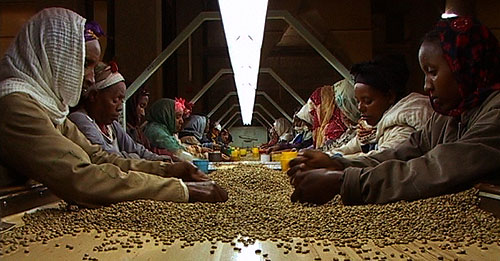Berkeleyan
 For sorting through coffee beans and discarding imperfect specimens, these Ethiopian women receive about 50 cents a day. |
The real cost of a café latte
Black Gold exposes the bitter grounds at the bottom of your cup
![]()
| 14 February 2007
After oil, coffee is the second-most-actively traded commodity in the world market, yet many of the farmers who grow and depend on the crop for their survival live in poverty. In Ethiopia, 15 million coffee farmers can barely eke out a living, even though coffee constitutes 67 percent of the country's export revenue. Famine has become commonplace, with seven million Ethiopians requiring emergency food aid each year.
The statistics, though compelling, don't tell the story on their own. Filmmakers Marc and Nick Francis - whose 2006 documentary Black Gold screens on campus next Friday at the Human Rights Watch International Film Festival - found an ideal protagonist in Tadesse Meskela, the soft-spoken manager of the Oromia Coffee Farmers Co-operative Union in southern Ethiopia, representing 74,000 coffee producers. Committed to seeing his farmers earn a living wage, Meskela travels internationally to find coffee roasters willing to pay more than the global exchange rate for his premium-grade coffee. Unfortunately, he is fighting an uphill battle.
Illuminating rights abuses Friday, Feb. 23 Saturday, Feb. 24 |
Two billion cups of coffee are consumed daily, and annual retail sales have rocketed from $30 billion in 1990 to $80 billion in 2005. Skimming off most of the profits are four multinational organizations that dominate the global coffee market: Kraft, Nestle, Proctor & Gamble, and Sara Lee.
A fraction of those proceeds dribble into the figurative cups of the Ethiopian farmers, who pray for an increase in the price of coffee. Currently, they receive two birr (24 cents) for a kilo of beans. That figure hasn't risen since the 1989 collapse of the International Coffee Agreement, at which time the commodity's price dropped to a 30-year low.
Meskela tells his growers that a kilo of coffee yields about 80 cups. Western consumers pay 25 birr ($2.90) on average for their cups of joe, calculates Meskela, or $230 a kilo. Unable to feed their families, support local schools, or keep their children clothed, the farmers would be happy to receive the equivalent of 60 cents per kilo. That amount, says one farmer, would change their lives.
Ethiopia and beyond
The situation transcends the plight of the Ethiopian coffee farmers. Many producers in the developing world are unable to earn a stable income that would lift them out of poverty, says George Scharffenberger, executive director of Berkeley's Blum Center for Developing Economies, who will introduce Black Gold at its screening next week. He viewed the film last semester in a global-poverty survey course taught by Ananya Roy, associate professor and chair of urban studies in the Department of City and Regional Planning.
The film, says Scharffenberger, offered an opportunity to reinforce one of the course's themes - that of "the connection between all kinds of purchasing decisions, made at every level right down to the consumer, that have a very real impact on those at the far end of the production chain."
Greedy governments pose part of the problem, he explains, operating between the producers and international buyers as monopolistic middlemen, funneling surplus funds back into their own coffers. "Everyone along the chain is using whatever power they have to get their piece of the pie. Unfortunately, from a power point of view, those at the base have the least, and they get the crumbs."
Unlike oil, a commodity in limited supply sourced primarily in the Middle East, coffee's producers are spread out and diversified. Coffee also lacks a cartel that can threaten disruptions. For these reasons, Scharffenberger doubts that the cost of coffee alone will bring the situation of producers like Meskela's farmers into consumers' consciousness.
"Consumers need to be educated about what they're buying, what their choices are, and the implications of those choices," he explains. As Americans have become more discriminating when purchasing food, some consumers are opting for locally grown, organic options. With coffee, says Scharffenberger, "One can imagine that some of the fair-trade issues could also be brought into that complex decision-making, so it's not just a question of the lowest price or the best quality but of shopping for products that have a dimension of better health, more environmental aspects, and certainly fairness in terms of peoples around the world."
Although fair-trade-certified agricultural products cost more, they offer consumers the opportunity to vote with their dollars. Money gets funneled into community development, health care, education, and environmental stewardship. To become fair-trade-certified, importers must meet strict international criteria.
Scharffenberger calls fair-trade coffee "only part of a solution." The efforts of individuals like Meskela and of organizations such as Oxfam and other NGOs are crucial to giving developing-world farmers a fighting chance. And growers can help themselves by "finding ways of differentiating their product, going organic, and making direct connections with purchasing groups like Illy [of Italy], Starbucks, and others."
Says Scharffenberger: "It's important to understand this is a very small planet. At the Blum Center, while our focus is on finding solutions - be they technologies or the building of opportunity in developing countries - we continue to be very conscious of the fact that the decisions we in the West make are related to the struggle of people around the world trying to pull themselves out of poverty."

